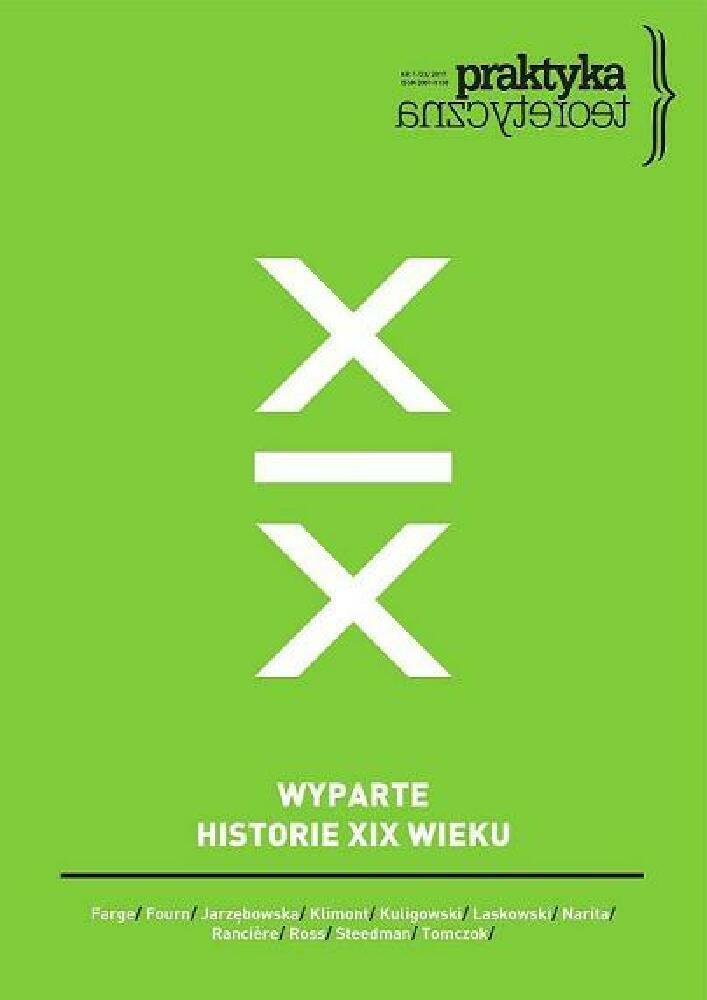Abstract
The text presented here is a chapter from Jacques Rancièreʼs La nuit des proletaires, an extended version of the author’s doctoral thesis. It focuses upon prospects for workers emancipation following the unsuccessful revolutionary attempt of July 1830. Rancière does not comment on struggles of power and instead, emancipation is seen here mostly as an intervention into the aesthetic. Aesthetic identification, popular spectacles, grassroots press, the selection of readings and even the design of rooms are all presented as genuine tools of the emancipatory effort. Rancière shows that workers culture, although syncretic and full of calque, turned out to be subversive enough so as to undermine class divisions.References
Béranger, Charles. 1832. „LʼÉmeute”. Le Travail 9 juin.
Bertaut. A. 1841. „Au Peuple”. La Ruche populaire févr.
Canneva, Augustin. 1838. Livre du tailleur, guide complet du tracé, de la coupe et de la façon des vetêments. Suivi de lʼHygiene du tailleur par M. Monneret. Paris: Pagnerre.
Commissaire, Sébastien. 1888. Mémoires et Souvenirs. Lyon: Meton.
Couannon. 1852. Le Parfait Tailleur. Paris.
Couannon. 1837, 1838. Journal des Merchands Tailleurs juill. 1837, janv. 1838.
David, Claude. 1848. Organisation du travail, Moyen d’obtenir pour chaque travailleur, à l’âge de 55 ans, une pension de mille francs par an. Paris.
Décembre, Joseph i Edmond Alonnier. 1862. Typographes et gens de lettres. Paris: Plein Chant.
Decoux, Alexandre. 1835. Jean-Jacques compris par les tailleurs ou Bonheur de tout ce qui peut coudre, aidé par la philanthropie. Paris.
Deluc. Projet dʼassociation des tailleurs de Bordeaux. A.N., F 12/4631.
Fanfernot, Julie. 1833. LʼÉtincelle. Paris: Prospectus.
Fonds Enfantin, Ms.: 7815, 7816, 7728, 7757.
Gilland, Jérôme-Pierre. 1850. „Biographie des hommes obscurs. André Troncin”. La Feuille du village 28 nov.
Gilland, Jérôme-Pierre. 1851. „Biographie des hommes illustres. Agricol Perdiguier”. La Feuille du village 3 avr.
Gilland, Jérôme-Pierre. 1850. „Biographie des hommes obscurs. André Troncin”. La Feuille du village 12 déc. 1850.
Gilland, Jérôme-Pierre. 1851. „Biographie des hommes obscurs. Adolphe Boyer”. La Feuille du village 13 févr. 1851.
Grignon. 1833. Réflexions dʼun ouvrier tailleur sur la misère des ouvriers en général la durée des journées de travail, le taux des salaires, les parrorts actuellement établis entre les ouvriers et les maitres dʼateliers, sur la nécessité des associations dʼouvriers, comme moyen dʼaméliorer leur condition. Paris.
Jay, Emile. 1851. „Visite aux associations”. Le Bien-Être universel 3 août.
LʼArtisan oct. 1842.
La Fashion 20 avr. 1842.
La Fashion 20 août 1842.
La Fashion déc. 1841.
Lachambeaudie, Pierre. 1864. „Le déjeuner à lʼécole”. W Cent fables. Paris: Pagnerre.
Ladimir, Jules. 1840. „Le compositeur typographe”. W Les Français peints par eux-męmes. Paris: Curmer.
Leneveux, Henri-Charles. Le Travail manuel en France. Paris: G. Baillière.
Leroux, Jules. 1833. Aux ouvriers typographes. De la nécessité de fonder une association ayant pour but de rendre les ouvriers propriétaires des instruments de travail. Paris: L.E. Herhan.
Perdiguier, Agricol. 1914. Mémoires dʼun compagnon. Paris.
Petycja ebenistów. A.N., F 12/4636.
Proudhon, Pierre-Joseph. 1858. De la Justice dans la Révolution et dans et dans l’Église. Paris: Garnier.
Proudhon, Pierre-Joseph. 1875. Correspondance. T. I–II. Paris: Lacroix.
„Spectacles populaires”. 1831. Le Globe 28 oct.
Voilquin, Suzanne. 1978. Souvenirs dʼune fille du peuple. Paris: F. Maspéro.
Vinçard, Jules. 1879. Mémoires épisodiques dʼun vieux chansonnier saint-simonien. Paris: E. Dentu.
Vinçard, Pierre. 1849. „Les ouvriers tailleurs”. Le travail affranchi 7 janv.
Vinçard, Pierre. 1851. Les Ouvriers de Paris. Paris: Gosselin.
License
“Theoretical Practice” seeks to put into practice the idea of open access to knowledge and broadening the domain of the commons. It serves the development of science, thinking and critical reflection. The journal is published in open-access mode under the CC-BY-NC-SA 4.0 license (detail available here: http://creativecommons.org/licenses/by-nc-sa/4.0/). Articles published in the journal may be freely distributed, stored, printed and utilized for academic and teaching purposes without restrictions.
They should not be, however, used for any commercial purposes or be reconstructed into derivative creations. Access to the journal may not be limited or offered for a fee by any third party.
Prospective authors are obliged to fill in, sign and send back the publishing contract compliant with the CC licencing. [PL.pdf, PL.doc, EN.pdf,EN.doc].
According to this contract, authors grant the journal a non-exclusive right to publish their work under the creative commons license (CC-BY-NC-SA 4.0) without any financial obligation on both sides of the contract.
Before submission authors should make sure that derivative materials they use are not protected by copyright preventing their non-commercial publication. Authors are responsible for any respective copyright violations.
